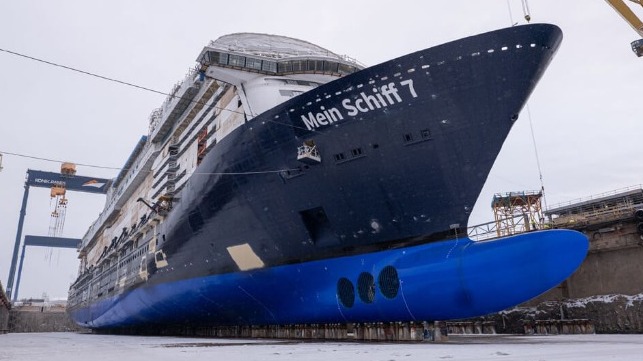First Methanol-Ready Large Cruise Ship Floated in Finland for TUI

The first large cruise ship designed to operate in the future on methanol or e-methanol was floated from the construction dry dock to begin the final phase of outfitting before her introduction in the summer of 2024. The third of three sisterships built at the Meyer Turku shipyard in Finland, the Mein Schiff 7 built for Germany’s TUI Cruises was adapted to the future use of alternative fuel as the cruise line pursues its net-zero ambitions.
“It is the first of its kind at the Meyer Turku shipyard and marks a huge leap forward in our pursuit of industry leadership in the green transition,” said Tim Meyer, CEO of Meyer Turku speaking about Mein Schiff 7 during the floating of the new cruise ship. The shipyard and cruise line have not commented on the specific design changes but noted the ship has “built-in methanol capability” for when the fuel is readily available. It will start operations using lower-emission marine diesel fuel.
TUI highlights the decision to prepare the new cruise ship for methanol propulsion as an important investment in the future. The cruise line’s goal is to provide the first climate-neutral cruises by 2030.
The cruise industry stands divided like much of the maritime world with many leading brands choosing LNG for their newbuilds as the best available fuel option. TUI Cruises is among the group with two large cruise ships to operate on LNG on order with Fincantieri while they adapted Mein Schiff 7 for methanol. TUI Cruises is a joint venture with Royal Caribbean Group, which also announced that they ordered the final cruise ship being built in France at Chantiers de l’Atlantique, Celebrity Cruises Xcel with engines adapted by Wärtsilä for tri-fuel methanol operations. Norwegian Cruise Line has also separated from the competition deciding to forego LNG and instead is working with MAN on methanol and its future newbuilds at Fincantieri will also adapted for methanol.
Construction on Mein Schiff 7 began in June 2022 with the ceremonial first steel cut and the first block was placed in the dry dock in March 2023. Meyer Turku noted at that point a quarter of the ship’s construction was complete as they began to bring together and weld the 85 steel blocks that make up the ship’s structure.
Despite snow drifts and temperatures at -7 degrees C (approximately 19 degrees F) the float out began on December 1 with the flooding of the dry dock. It takes about eight hours and 300 million liters of water to completely flood the 16 meter (52 foot) dry dock. The second stage called for the ship to be moved forward to the fitting-out basin over the weekend.
Structurally, Mein Schiff 7 is a sistership to Mein Schiff 1 delivered in 2018, and Mein Schiff 2 delivered in 2019. Each is 315.7 meters (1,035 feet) in length and 111,500 gross tons. They have accommodations for 2,894 passengers (double occupancy) and a crew of approximately 1,000 people. When they enter service the cruise ships are registered in Malta.

that matters most
Get the latest maritime news delivered to your inbox daily.
In addition to the new methanol-ready capabilities, the Mein Schiff 7 is being outfitted with catalytic converters that reduce NOx emissions by around 75 percent and she will have shore power capabilities. The ship will also have new advancements in waste and wastewater treatment capabilities.
The schedule calls for Mein Schiff 7 to be commissioned in the summer of 2024. She will begin operating to the North Cape and Iceland in July from Germany. In September 2024, she will begin cruises around the Baltic.
